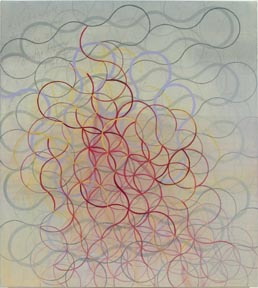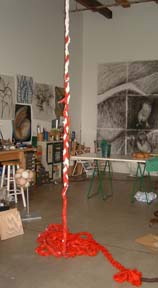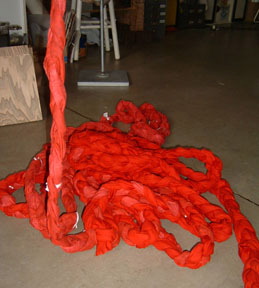(aka 'devolution')


 "Red Letter Day, No. 1" |
 "Red Letter Day, No. 2" |
 "Hester Prynne" |  "Roger Chillingworth" |

 "Braid" |
 "Braid (Detail)" |
| Chris: The action is much more than just an act of sexual impropriety, but an action against the community as a whole....Her action has become a disturbance to the community, unhinging and unsettling it, and even a threat to refound it....However, the reader sees that society is too large, too power fulfor her uprising to be any more than a feeble attempt, that in the end strengthens communities' belief in itself, even more than before. | Lauren: where do you see this happening? How is her action threatening to untie the fibers of the community? Is the community disintegrating around her? If so, I really don't see it. More than anything, I think you could make the case that she makes the community stronger by removing herself from its midst. It becomes "Hester" v. "Not-Hester" and this faceless, amorphous character of "the town" gains something more like a structure by the mere fact that "she" is not like "them." |
| Laura O: with this novel I feel it is my right to participate in the storyline....Hawthorne has placed me unwillingly side by side with his characters. I feel uncomfortably close to them...living alongside the people of this town....I leave with a sense of uneasiness....It doesn't come neatly packaged, but it still blows my mind. | Jorge: I keep going through the ending in my head trying to fight the feeling of disappointment ... what was the use of confessing in front of such a huge crowd his sin right before his death?...What did he solve?...Was his honesty of any value to them? Did he teach them a lesson with his honest death? |
| Jessica: At first it was Dimmesdale who really got to me...most of all the way he claimed that his own suffering in silence was some how quantifiably worse than Hester's public shame....Am I reading Dimmesdale as the schmuck Hawthorne wanted him to be seen as?....In my quad group on Tues, we dubbed Dimmesdale the ultimate dead-beat dad. | Margaret: I agreed with our dubbing of Dimmesdale as the ultimate dead-beat dad. However, I did feel sorry for him in the beginning. Here is this sincerely religious man who strays a bit and decides to punish himself for the rest of his life for his sin....But then the ending, and oh, was I angry at Dimmesdale. He was so close to being free with Hester....and yet so far away....How could he be so "inconsiderate and demeaning against me and mine"? |
 "Untitled" |
 "Untitled" |
